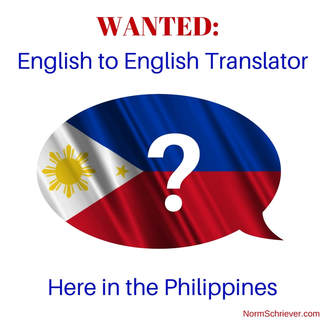
With linguistic differences running the gambit from charming to ingenious to just head scratching, the quest for mutual understanding is often elusive. I swear that most of the time, Filipinos just look at me and nod but don’t register a word I’m saying!
But before I look to hire an English-to-English translator, I remind myself that it’s all part of the wonderful Grand Experience of life as an expat.
So in the spirit of celebrating those differences, here are some of my observations on language and communication here in the Philippines:
I love it that twice is nice in the Philippines with words like “loko loko,” “halo halo,” “oh-oh,” and “sige sige.”
Sometimes, it’s just pronunciation that differs, such as the amusing Filipino pronunciation of “Lotto” as “LOte-TOE.”
But I can’t accuse Filipinos of being anything but ultra-positive because they seem to be incapable of saying “no.”
“Can I please order the chicken sandwich?”
“Yes, I’m sorry we don’t have that today.”
"Wait, yes you do, or yes you don’t?
“Yes”
The answer is always “yes” even if I ask a two-part question, like:
“Excuse me, is the market over there or is it that way?”
“Yes.”
Or I’ll get a “Yes” with a coy smile and a nod if I ask something and they’re not sure of the answer, sending me on a wild goose chase.
That same fun game of Let’s Confuse The Foreigner extends to directions, as trike drivers ask me all the time if they should take a left, or the other left instead (right).
Filipinos also love abbreviations, acronyms, and creative shortcuts. I’m getting familiar with lingo like "Resto” for restaurant, “Pax” for passengers, “Good PM,” instead of good evening or afternoon, “OFW” for Overseas Filipino Worker, “KJ” for kill joy, and something called “OA” if you are being over dramatic.
But I find that they despise “LOL” (laugh out loud) for some strange reason.
Filipinos will joke that they have a nose bleed if they don’t relate or don’t understand something I said, while in America that means you have bad seats at any event because you’re so high up, the altitude is making your nose bleed.
Some modern sayings were born from Filipino interaction with American military servicemen, like the tendency to call Americans “Joe” as in G.I. Joe – often with a sharp salute.
A fascinating example of this is the Fil-Am Franken-word, “buckwheat." It came from World War II when Americans used the word “evacuate” and Filipino soldiers repeated it with their accents as “bokweet.” That endeared U.S. servicemen, who started calling an evacuation a “buckwheat” in honor of their Filipino comrades.
And I have to be careful when I say “salvage,” which means to rescue something from wreckage in American English but refers to murder or extra-judicial killings in the Philippines, derived from the Tagalog word “salbahe” (naughty, abusive) and the Spanish “salvaje” (savage) before that.
I’ve noticed that many Spanish words are spelled phonetically, like “gwapo,” which comes from the Español word “guapo” and “eskuela” from “escuela.”
Likewise, their attempts at writing English – like on Facebook – can sometimes take a turn for the hilarious. I’m not lying when I say that I’ve seen “A little bit” written as “Little Beth, “Anonymous” as “Not a miss,” and my favorite, “Bon appetite,” as “Bone app de teeth.”
Filipinos can even breathe life into an inanimate thing with sayings like “We had a traffic” and “It’s very traffic,” or “Did you have a mud in your house after that rain last night?”
Communication in the Philippines also employs plenty of symbols, like sticking out your tongue and crossing your eyes in response to someone's silliness or pandering, and framing your face with your forefinger and thumb to indicate that you're pogi it in photos.
Nonverbals come into play, too, as Filipinos can have whole conversations just by pointing their lips, raising their eyebrows, or with the ubiquitous subtle head nod.
“What would you like to you avail?” caused me pause when I first moved here, since the word “avail” really isn’t used in American English.
Filipinos will say “See how you are?!” when you’ve said something irreverent, and I’ve learned the hard way that a “green minded” person isn’t concerned with the environment, but something far more naughty.
You should have seen my waitress’ look of shocked embarrassment when I asked for napkins at a restaurant! Thankfully, she only handed me a box of tissues.
And I love the way they’ll add “only” after telling me how much something costs, like “That’s 2,000 Pesos ONLY,” as if to soften the blow.
But that’s still better than the most popular answer to “How much does it cost?” here in the Philippines, “How much can you pay?”
 RSS Feed
RSS Feed